By Sara E. Teller & stephanie loveless
ALTHOUGH HE LIVES IN LANSING, Hugh McNichol quite possibly knows – and cares – more about Ferndale elections than pretty much anyone who actually lives here.
He’s been working with the State Bureau of Elections, regarding Ferndale. He’s been lobbying the State legislature on our behalf. He helped form a Lansing chapter of the organization, Represent Us, and organized a rally at the State Capitol earlier this year as part of his election reform efforts. And so much more.
And you’ve probably never even heard his name before.
“Ferndale was technically my first home. I was born in Warren because Ferndale — where my parents lived –didn’t have a hospital, or so my parents tell me. We moved to Lansing shortly after and I’ve called Lansing my home ever since. I joined the Army Reserves after high school (2000) and in 2006-2007, I deployed to Iraq. That’s probably what got me interested in governments, not just ours but world-wide.”
McNichol became involved in the push for Instant Run-off Voting (IRV) last year after the results of the election. He wasn’t in favor of either of the two front runners and didn’t think it was right to be forced into choosing someone he dislikes over a candidate he believes in. “Should I vote my ideals and waste my vote on a candidate that has no chance?” Hugh asked himself, “or, should I vote the reality of the race and choose the lesser of two evils?” The current voting system doesn’t allow for other options.
“I realized our democracy is broken whenever more than two candidates are running, and I wanted to help fix it. IRV allows us to vote our ideals without worrying about it helping the candidate we dislike the most.” Under this voting system, “winners must have majority support, more than 50 per cent of the vote (as opposed to a mere plurality). It empowers voters and makes their preferences matter,” Hugh explains.
With IRV, a voter is given the opportunity to rank their choice of candidates one-two-three. For example, in 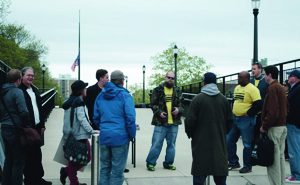 the last general election, a voter may have marked their ballot 1) Clinton, 2) Stein, 3) Johnson. If any candidate gets a simple majority, they win. If nobody gets at least 50 per cent, then the candidate with the fewest votes is eliminated, and if that candidate is your first choice then the second choice on your ballot is counted instead. The process continues until finally one candidate emerges with majority support of the electorate.
the last general election, a voter may have marked their ballot 1) Clinton, 2) Stein, 3) Johnson. If any candidate gets a simple majority, they win. If nobody gets at least 50 per cent, then the candidate with the fewest votes is eliminated, and if that candidate is your first choice then the second choice on your ballot is counted instead. The process continues until finally one candidate emerges with majority support of the electorate.
“One of my favorite applications for IRV is its use by military voters located overseas,” he says. Five states allow members of the military overseas to rank their choice of candidates. This ballot can then be counted in the primary, general, and any subsequent runoff election, instead of their local clerks having to mail them another ballot. Right now, if a ballot arrives after the votes are counted in a primary, it doesn’t count.
“That’s an unnecessary disenfranchisement of our service members overseas and I’d like to see more states, including Michigan, adopt it.”
IN 2004, THE RESIDENTS OF FERNDALE voted overwhelmingly – 70 per cent to 30 per cent — in favor of using IRV for our mayoral and council races. So why aren’t we using the system? For one thing, Ferndale’s voting machines at the time were incapable of the simple calculations necessary to conduct an IRV election. Addition-ally, there have been roadblocks from the State. “When I’d found out that the biggest roadblock impeding implementation was the cost of upgrade to compatible machines, I started calling the Bureau of Elections. I requested that the new machines they were already planning to purchase be IRV compatible, especially because Ferndale had been waiting since 2004,” McNichol says.
His efforts, along with that of other supporters, were not wasted, and Ferndale’s new machines are indeed capable of IRV.
However, there was yet another challenge to over-come. “The next hurdle was ballot instructions. Although IRV, or “preferential voting,” is authorized in our State Constitution, Michigan’s Election Law con-tains no official ballot instructions to tell voters how to rank their preferences.” Without instructions, voters might get confused. But adding step-by-step directions is as simple as including something like:
1) Pick your first-choice candidate, and darken the oval next to that candidate under “1st Choice.”
2) If you have a 2nd choice candidate, darken the oval next to that candidate under “2nd Choice.”
3) Continue until you have ranked all your choices.
With the help of the nonpartisan national election reform organization, FairVote (www.fairvote.org) and clerks in both Ferndale and Lansing, these instructions have been drafted and are currently under review at the Secretary of State. If approved, “it’ll go to legislative services who’ll make sure it’s in compliance. This could also take weeks or months, or could be outright rejected,” Hugh explains.
Sadly, that does not seem to be the end of the story. On July 27, 2017, Ferndale City Clerk Marne McGrath said she is coming to the conclusion that “just because election law doesn’t specifically prohibit it, it also doesn’t allow it.” She said FairVote is “looking closely at voting instructions. Although I feel they are on the right track, election law is long, old, and not always clearly written. Michigan is one of only eight states that administer elections at the local level and it can be frustrating working with such a decentralized system.”
Perhaps a legislative solution will be required for Ferndale to finally fulfill the will of its voters expressed more than a dozen years ago. Or perhaps the City should pursue a more assertive approach. The voters are waiting.
“In the meantime,” McNichol said, “I’m advocating for IRV to our state legislators. Most of them had never even heard of it. Now we have supporters from both sides of the aisle, but we need more.”
McNichol, along with the help of Ferndale resident and Exec. Director of Citizens for a Fair Ferndale, Kathryn Bruner James, sent Rep. Robert Wittenberg and Sen. Vincent Gregory emails, and has traveled to their offices to solicit their sponsorship. “Ferndale is their district. The people of Ferndale are their constituents,” McNichol explains. However, “Neither knew what IRV was or that Ferndale had passed it in ‘04,” he says, defeatedly. “Education and time have probably been the biggest setbacks.” It takes quite a bit of time to knock on doors and get people to listen.
As far as an estimated timeframe for the roll out of the new voting system, Hugh says, “My best guess is 2019, but the Ferndale Election Commission will ultimately decide when IRV will be implemented in Ferndale.” This is because the 2004 referendum, perhaps unwisely, gives our local election com-mission ultimate authority over the matter, beyond approval of the County and State. Even then, if our local election commission decided it does not want IRV, Ferndale voters would be forced to go back to the polls to take the matter out of their hands. (Ferndale’s Election Commission consists of the city clerk, mayor and city attorney.)
Currently, this does not seem to be a concern. Mayor Coulter said recently, “”For cities without a primary election for local offices, IRV can help ensure voters actually elect the candidates they want. We’re hopeful that with the new equipment we can finally implement this system.” And McGrath also seems genuinely interested in implementation. McGrath stated: “I am confident that we will see a lot of movement on this in the next two years.”
And so we wait. In the meantime, supporters should contact their elected officials to urge IRV be implemented in Ferndale. See below.
Rep. Robert Wittenberg: Box 30014, Lansing, MI 48909-7514; (517) 373-0478; robertwittenberg@house.mi.gov
Sen. Vincent Gregory: BOX 30036, Lansing, MI 48909, senvgregory@senate.michigan.gov; (517) 373-7888
If you are interested in working for IRV in Ferndale, contact: stephanie loveless at steffie@ferndalefriends.net
Hugh McNichol: 517-420-8452; hugh.mcnichol@gmail.com
For more information, contact:
FairVote: www.fairvote.org, 6930 Carroll Ave Ste 240, Takoma Park MD 20912, 301-270-4616, info@fairvote.org
FIRV : www.firv.org
Ranked Choice : www.rankedchoicevoting.org
Represent Us: https://represent.us/
 cozy interior, including a range of beautiful artwork on the walls from local artist, Sumi Lee. Colleen Smiley was the original owner of The Om for over 20 years, and she helped forge a path ahead for those who favor a meat-free diet. While the meatless market is widely accepted as a healthy lifestyle in modern times, public perception was not always so favorable. The emphasis at The Om has been consistently on meatless cuisine, with menu options focusing on homegrown and organic fruits & vegetables, plus GMO-free/pesticide-free grains (macrobiotic and gluten-free menu options included). The Om formerly served fish, but these days the only non-vegan foods served are cheese (with certain dishes), and eggs are available on the brunch menu at least for the near future.
cozy interior, including a range of beautiful artwork on the walls from local artist, Sumi Lee. Colleen Smiley was the original owner of The Om for over 20 years, and she helped forge a path ahead for those who favor a meat-free diet. While the meatless market is widely accepted as a healthy lifestyle in modern times, public perception was not always so favorable. The emphasis at The Om has been consistently on meatless cuisine, with menu options focusing on homegrown and organic fruits & vegetables, plus GMO-free/pesticide-free grains (macrobiotic and gluten-free menu options included). The Om formerly served fish, but these days the only non-vegan foods served are cheese (with certain dishes), and eggs are available on the brunch menu at least for the near future. currently handling the majority of the café operations, along with her husband, Matthew Helsel, and a team of 12 other staff. Norwood was introduced to The Om Café at age three, through her mom, and worked her way up over the past five years, from waitressing to management, then into ownership. She fondly describes The Om as, “a child of mine since I was little…I used to empty my piggy bank for a nori roll! This is absolutely my dream job. I can’t imagine being away from this space and this environment.”
currently handling the majority of the café operations, along with her husband, Matthew Helsel, and a team of 12 other staff. Norwood was introduced to The Om Café at age three, through her mom, and worked her way up over the past five years, from waitressing to management, then into ownership. She fondly describes The Om as, “a child of mine since I was little…I used to empty my piggy bank for a nori roll! This is absolutely my dream job. I can’t imagine being away from this space and this environment.” forms of vegan cuisine, and being a chef is generally an egocentric profession. But I continuously learn and grow. Food is life. It’s a gift to enjoy. Every member of staff here plays a pivotal role.”
forms of vegan cuisine, and being a chef is generally an egocentric profession. But I continuously learn and grow. Food is life. It’s a gift to enjoy. Every member of staff here plays a pivotal role.” donation box inside the café and the proceeds go to a local shelter. Recently, she hosted a “Nom Week,” where The Om joined forces with the nosh pit food truck, and together they raised money for Ferndale’s Catfe Cat Shelter.
donation box inside the café and the proceeds go to a local shelter. Recently, she hosted a “Nom Week,” where The Om joined forces with the nosh pit food truck, and together they raised money for Ferndale’s Catfe Cat Shelter.


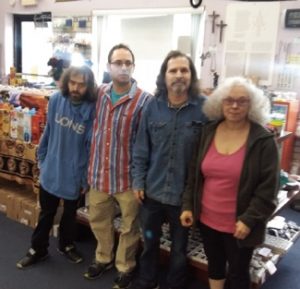 eclectic selection of items, Knight Light is a relaxing treat to browse around. The store is a family-run business, previously situated for two decades in Detroit (at Mt. Elliott & Gratiot). Customers come from all over to shop – including many from out-of-state locations and Canada.
eclectic selection of items, Knight Light is a relaxing treat to browse around. The store is a family-run business, previously situated for two decades in Detroit (at Mt. Elliott & Gratiot). Customers come from all over to shop – including many from out-of-state locations and Canada.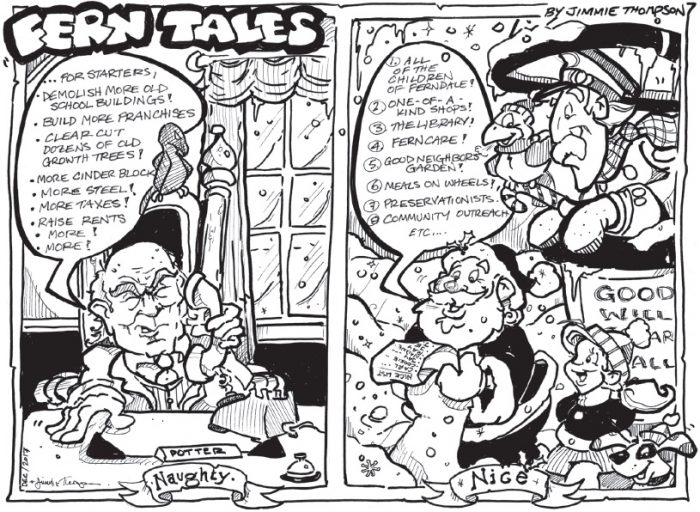
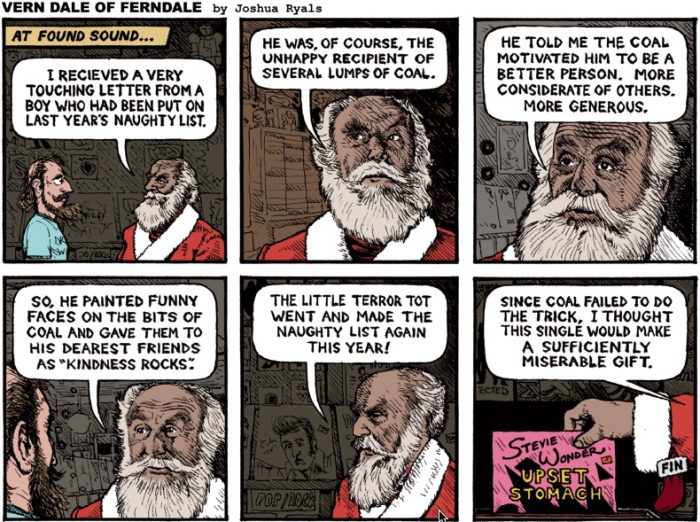



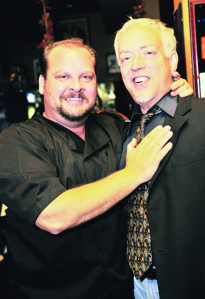 possible place to try and attract LGBT people, artists, young folks, and other alternative types. It took a decade to make this happen but eventually they came to this eclectic, middle-and-working-class town, and created what we now know as this cool place.
possible place to try and attract LGBT people, artists, young folks, and other alternative types. It took a decade to make this happen but eventually they came to this eclectic, middle-and-working-class town, and created what we now know as this cool place.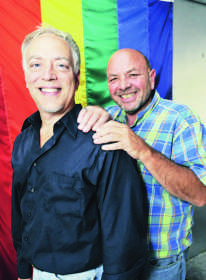 race. To this day, Ferndale has the least number of officers of color than any city around us. As the march toward high-end development and further gentrification continues, I hope the city does not price itself out of reach to young people, seniors, and ethnic and racial minorities. It would be a shame if we turned into another Royal Oak or Birmingham.
race. To this day, Ferndale has the least number of officers of color than any city around us. As the march toward high-end development and further gentrification continues, I hope the city does not price itself out of reach to young people, seniors, and ethnic and racial minorities. It would be a shame if we turned into another Royal Oak or Birmingham.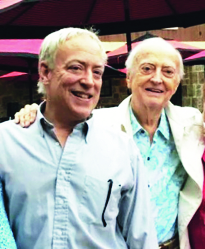 therapy, and even dancing in the down-town. Gay people and African Americans were barely tolerated. The downtown was barren, and the neighborhoods bordered on shabby. Today it is full of energy, young people, and at least purports to be welcoming to all.
therapy, and even dancing in the down-town. Gay people and African Americans were barely tolerated. The downtown was barren, and the neighborhoods bordered on shabby. Today it is full of energy, young people, and at least purports to be welcoming to all.
 the last general election, a voter may have marked their ballot 1) Clinton, 2) Stein, 3) Johnson. If any candidate gets a simple majority, they win. If nobody gets at least 50 per cent, then the candidate with the fewest votes is eliminated, and if that candidate is your first choice then the second choice on your ballot is counted instead. The process continues until finally one candidate emerges with majority support of the electorate.
the last general election, a voter may have marked their ballot 1) Clinton, 2) Stein, 3) Johnson. If any candidate gets a simple majority, they win. If nobody gets at least 50 per cent, then the candidate with the fewest votes is eliminated, and if that candidate is your first choice then the second choice on your ballot is counted instead. The process continues until finally one candidate emerges with majority support of the electorate.
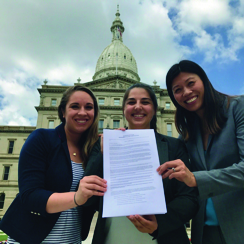
 dedicated to democracy and America. Names like “Fair Districts Mass” and “Protect Your Vote” and “The Center for a Better New Jersey.” But a deep-dive investigation by ProPublica (an independent, nonprofit newsroom that produces investigative journalism with moral force.) found that while these groups purport to help represent voters in their communities, their main interest is gaining a political advantage in the fight over redistricting. Powerful players are turning to increasingly sophisticated tools and techniques to “game” the redistricting process, while voters are almost all blind to their shenanigans, and ultimately losing.
dedicated to democracy and America. Names like “Fair Districts Mass” and “Protect Your Vote” and “The Center for a Better New Jersey.” But a deep-dive investigation by ProPublica (an independent, nonprofit newsroom that produces investigative journalism with moral force.) found that while these groups purport to help represent voters in their communities, their main interest is gaining a political advantage in the fight over redistricting. Powerful players are turning to increasingly sophisticated tools and techniques to “game” the redistricting process, while voters are almost all blind to their shenanigans, and ultimately losing.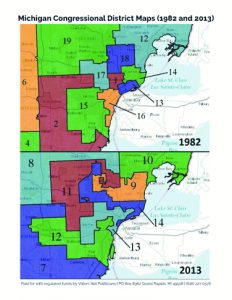 two parties manipulate our election maps in 2020, when the next census is conduct-ed. Both parties are preparing to continue the tradition of partisan gerrymandering and have very distinct and aggressive strategies in place to secure voting districts: the Republicans are preparing a project called REDMAP 2020 and the Democrats are preparing their own project named ADVANTAGE 2020.
two parties manipulate our election maps in 2020, when the next census is conduct-ed. Both parties are preparing to continue the tradition of partisan gerrymandering and have very distinct and aggressive strategies in place to secure voting districts: the Republicans are preparing a project called REDMAP 2020 and the Democrats are preparing their own project named ADVANTAGE 2020.
 detrimental to the overall health of the environment (minimizing, if not eliminating the use of poisons). This group is intended for those that are ready to take action and learn, not to blame, complain and wait for others to do something. We are not a pest control service – we’re a grassroots organization of citizens and neighbors who perform outreach to educate on what drives the rat population, help eliminate rat habitat, and empower homeowners to remove rats effectively and manage their property to eliminate the rat population.
detrimental to the overall health of the environment (minimizing, if not eliminating the use of poisons). This group is intended for those that are ready to take action and learn, not to blame, complain and wait for others to do something. We are not a pest control service – we’re a grassroots organization of citizens and neighbors who perform outreach to educate on what drives the rat population, help eliminate rat habitat, and empower homeowners to remove rats effectively and manage their property to eliminate the rat population.